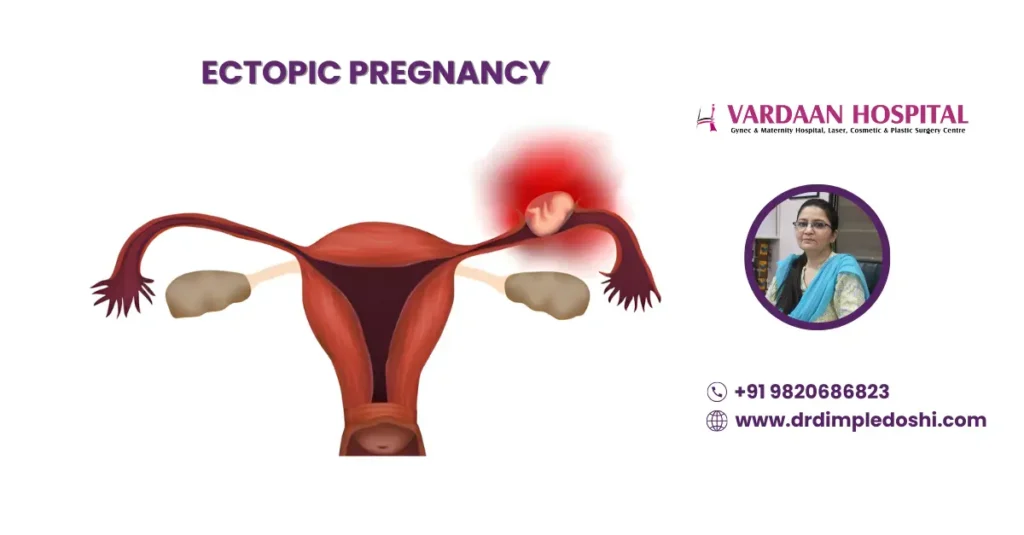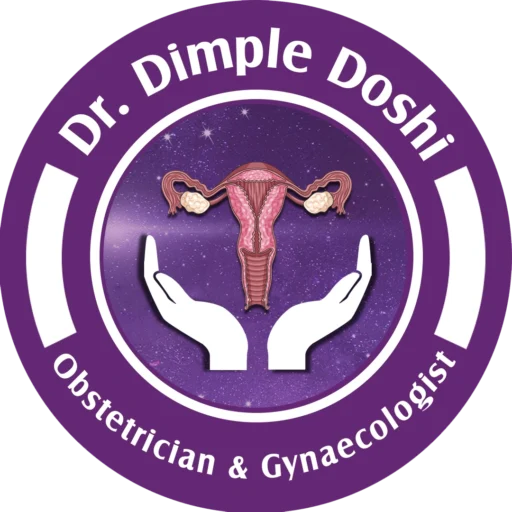Ectopic Pregnancy: Causes, Symptoms, Diagnosis & Treatment

What is an Ectopic Pregnancy?
Ectopic pregnancy occurs when a fertilized egg implants and grows outside the uterus, commonly in the fallopian tube. It is a serious and potentially life-threatening condition requiring immediate medical attention.
The term “ectopic” originates from the Greek word ektopios, meaning “out of place.”
Incidence of Ectopic Pregnancy
- 1-2% of natural conceptions result in ectopic pregnancies.
- 4% of pregnancies conceived via assisted reproductive technology (ART) are ectopic.
- 6% of maternal deaths in the first trimester are caused by ectopic pregnancies if left undiagnosed or untreated.
- Many cases come as a surprise, turning the joy of pregnancy into a medical emergency. Ruptured ectopic pregnancies can lead to internal bleeding, shock, and even death.
- With increased awareness and advanced diagnostic tools, early detection has reduced severe complications.
Types & Sites of Ectopic Pregnancy
More than 90% of ectopic pregnancies occur in the fallopian tubes, but they can also occur in other locations:
- Fallopian Tube (most common)
- Ovary
- Previous Cesarean Scar
- Heterotopic Pregnancy (one pregnancy inside the uterus, another outside)
- Abdominal Pregnancy (very rare)
Causes of Ectopic Pregnancy
Several risk factors increase the chances of ectopic pregnancy:
- Pelvic Inflammatory Disease (PID) (including tuberculosis or sexually transmitted infections)
- Multiple Sexual Partners
- Infertility
- Age (higher risk if under 18 or over 35)
- Assisted Reproductive Techniques (ART)
- Previous Ectopic Pregnancy
- Tobacco Smoking
- Tubal Ligation or recanalisation Surgery
- Use of an Intrauterine Device (IUD)
Signs & Symptoms of Ectopic Pregnancy
Early Symptoms:
- Nausea
- Vomiting
- Dizziness
- Occasional lower abdominal pain
- Vaginal spotting or irregular bleeding
Symptoms of Ruptured Ectopic Pregnancy:
- Severe lower abdominal pain
- Abdominal distension
- Internal bleeding (can lead to shock and fainting)
Diagnosis of Ectopic Pregnancy
Ectopic pregnancy is diagnosed using:
- Clinical Examination by a gynecologist
- Urine Pregnancy Test
- Ultrasound (to detect pregnancy location and signs of rupture)
- Serial Beta-hCG Blood Tests (to monitor pregnancy hormone levels)
Treatment Options for Ectopic Pregnancy
Conservative (Non-Surgical) Approach:
- Watchful Waiting: If detected early, doctors may monitor beta-hCG levels before intervening.
- Medical Management: Methotrexate injections stop fetal cell growth. Patients require hospital monitoring for any complications.
Surgical Approach:
- Laparoscopy (Minimally Invasive Surgery) – Gold standard for treatment
- Tiny incisions are made on the abdomen.
- Carbon dioxide gas inflates the abdomen for better visibility.
- A laparoscope (camera-equipped instrument) guides the procedure.
- The ectopic pregnancy is removed with minimal scarring and faster recovery.
- Laparotomy (Open Surgery):
- Used in emergency cases with severe internal bleeding.
- Requires a larger abdominal incision (8-9 cm).
Types of Surgeries:
- Salpingotomy/Salpingostomy (Preserving the fallopian tube)
- Salpingectomy (Removal of the affected tube)
Recovery After Laparoscopic Surgery
Diet:
- Liquids can be started 6 hours post-surgery.
Mobilization:
- Patients can start walking 4 hours after surgery.
Hospital Discharge & Follow-Up:
- Most patients are discharged within 24 hours.
- Follow-up is scheduled 6 days after surgery.
Advantages of Laparoscopic Surgery for Ectopic Pregnancy
- Shorter hospital stay
- Less post-operative pain
- Minimal scarring (small keyhole incisions)
- Faster recovery compared to open surgery
Ruptured Ectopic Pregnancy: A Life-Threatening Emergency
A ruptured ectopic pregnancy can cause massive internal bleeding and shock. Emergency surgical removal of the pregnancy and damaged fallopian tube is the only life-saving option.
Future Pregnancy After Ectopic Pregnancy
Many women successfully conceive after an ectopic pregnancy. Doctors generally recommend waiting for at least 3 months or 2 menstrual cycles before trying again.
Success Rates:
- 65% of women conceive naturally within 18 months.
- 85% of women conceive within 2 years.
- Success depends on the health of the remaining fallopian tube.
Why Choose Dr. Dimple Doshi for Ectopic Pregnancy Treatment
Dr. Dimple Doshi is a highly experienced gynecologist specializing in ectopic pregnancy management. At Vardaan Hospital, Mumbai, she provides:
- Expert Diagnosis & Treatment – Advanced ultrasound and laparoscopic techniques for accurate detection and treatment.
- Personalized Care – Tailored treatment plans based on individual patient needs.
- Minimally Invasive Surgery – Expertise in laparoscopic procedures for faster recovery and minimal scarring.
- Comprehensive Women’s Health Services – Holistic care from diagnosis to post-treatment follow-ups.
- Trusted & Experienced – Years of experience handling complex gynecological cases with high success rates.
For expert consultation on ectopic pregnancy, visit Dr. Dimple Doshi at Vardaan Hospital, Mumbai.
Medical Code for Ectopic Pregnancy
ICD-10 & CPT Codes for Ectopic Pregnancy
ICD-10 Codes:
- O00.1 – Tubal pregnancy
- O00.2 – Ovarian pregnancy
- O00.8 – Other ectopic pregnancy (e.g., cervical or abdominal)
- O00.9 – Unspecified ectopic pregnancy
CPT Codes:
- 59120 – Surgical treatment without salpingectomy
- 59121 – Surgical treatment with partial or total salpingectomy
- 59150 – Laparoscopic treatment without salpingectomy
- 59151 – Laparoscopic treatment with salpingectomy
For expert consultation on ectopic pregnancy, visit Dr. Dimple Doshi at Vardaan Hospital, Mumbai.
